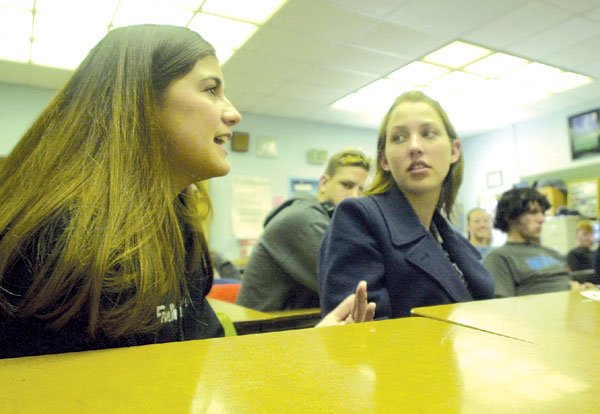GILROY
– In lieu of standard disciplinary action, Gilroy High School is
offering a special Saturday seminar on civil disobedience for
students who ditched class two weeks ago to protest the war with
Iraq.
GILROY – In lieu of standard disciplinary action, Gilroy High School is offering a special Saturday seminar on civil disobedience for students who ditched class two weeks ago to protest the war with Iraq.
Roughly 80 juniors and seniors will participate Saturday in the hour-and-a-half session comprised of lectures and writing assignments about conscientious objectors. On April 12, the session will be presented to underclassmen who walked out during the protest.
“It’s not that we’re promoting protest, but for a protest to have meaning there is consequence,” GHS Assistant Principal Greg Camacho-Light said. “You also have to have a conviction when you protest. You can’t just say ‘Hey, let’s get out of sixth period and walk out the door.’ ”
On March 21, about 300 GHS students walked out of class in protest to the onset of Operation Iraqi Freedom. Many of the students came back to class immediately, but others left campus and did not return.
Absent from the walk-out was any clear demonstration, such as the speeches, picketing or chanting that typically accompany a war protest.
“This was not an organized march,” Camacho-Light said. “This wasn’t done during a lunch break. It was done during class time.”
Typically when students ditch class they are punished with a detention. Students often are made to help with cleaning the school or assisting with other maintenance around campus.
The 90-minute Saturday sessions will run the amount of school time student demonstrators missed.
The session will be led by Camacho-Light, fellow Assistant Principal Joni Madolora, social science teachers Darren Yafai and Deborah Petranek, and other faculty members. Students will have to write two essays, one at the beginning of the session explaining why they walked out, and another describing what they learned about civil disobedience from the Saturday session.
Faculty will lecture and lead discussions about conscientious objectors such as Gandhi, Henry David Thoreau and Rosa Parks.
“There will be a lot of information in the hour and a half,” said Camacho-Light. “We don’t want to punish them by boring them.”
Instead, Camacho-Light said, the school wants students to understand the consequences and seriousness of protest and be able to differentiate between their actions March 21 and what, for instance, Gandhi did when protesting British law in India.
Gilroy Unified School District has been careful to keep normal curriculum clean from the discussion about the war. In an e-mail, the GUSD’s assistant superintendent of educational services Jacki Horejs told principals the following:
“Please let your teachers know that regardless of the situation in Iraq, students should not be allowed to watch TV coverage of the news (during class time) unless it is directly tied to the instructional focus. Social Studies classes may have direct instructional objectives that would justify watching some limited coverage of current events, but the core instructional program should not be interrupted.”
In an interview Thursday, Horejs said, “We felt it was important to be consistent throughout the district. This is not a policy voted on by the (school) board, it’s a guideline for schools.”
GUSD has also made principals aware of resources on the Internet which explain how to discuss war events in an age-appropriate manner. Some schools have also had district psychologists meet with staff to discuss how to detect signs of stress or trauma in children.
Las Animas Elementary School Principal Sylvia Reyes said her students have been handling the events of the war very well.
“After September 11, I heard kids talking about the things they saw on TV during their lunch break and recess. I haven’t really heard that at all about the war,” Reyes said. “Maybe 9-11 hit closer to home for most children.”
Still the war hits close enough to home to spur discussion in some classrooms. GHS journalism teacher Elizabeth Baker-Chapman had her students right essays on media coverage of the war. They discussed the topic in a recent class session.
Only one student out of two dozen said they would want to be an embedded journalist in Iraq.
“We would not have the information we’re getting now in half the time if it were not for the journalists there, but I don’t know if that’s worth risking their lives,” student Jenny Clet said.
The war discussion was refreshing for at least some students. GHS senior and a columnist for The Dispatch Megan Stevens said she was surprised the ongoing war has not been a bigger part of curriculum at GHS.
“Our generation hasn’t grown up with this,” Stevens said. “I thought there would be more discussion just because this is such a big event, and I thought there would be more discussion connecting the war to things we’re studying now.”













